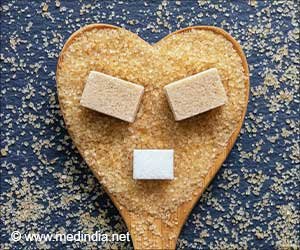Free Sugars Might be the Sweet Way to Get Heart Disease

The study relied on data about the eating habits of more than 110,000 people ages 37 to 73 in the United Kingdom, whose health outcomes were then tracked over about nine years.
For each 5% higher total energy from free sugars, the associated risk of total cardiovascular disease was 7% higher. The authors found that the risk of heart disease was 6% higher, while the risk of stroke was 10% higher.
An author of the study, Cody Watling, a doctoral student at the University of Oxford, said that the most common forms of sugar the study participants ate were ‘preserves and confectionary,’ with the latter category including cookies, sugary pastries, and scones. Fruit juices, sugar-sweetened beverages, and desserts were also common.
Advertisement
Sugars that occur naturally in whole fruits and vegetables are not considered ‘free sugars’ and were excluded from the analysis.
Researchers analyzed data from the UK Biobank, a large-scale database of health records, which included multiple assessments of participants’ diets. The researchers studied the assessments to estimate participants’ carbohydrate intakes, then further broke that down by type of carbohydrate to focus on free sugars. Then the authors compared that to the participants’ incidence of cardiovascular disease.
95 Grams of Free Sugar is the Most Dangerous
The people found to have the highest risk of heart disease or stroke consumed about 95 grams of free sugar per day, or 18% of their daily energy intake, Watling said.
By comparison, U.S. guidelines suggest that added sugars should make up no more than 10% of one’s daily calories.
Avoiding sugar-sweetened beverages is probably the single most important thing we can be doing. Researchers added that although there are some health benefits to drinking a small glass of orange juice occasionally, its sugar content means a glass of fruit juice is the same thing as soda.
Guidelines about sugar intake rely on percentages of total energy because setting a limit in grams does not consider the variations in people’s dietary needs. Different people of different sizes have a varied calorie requirement.
Instead of Sugar, Have Fiber
The researchers found a positive relationship when it comes to fiber, unlike sugar intake. Consuming 5 grams of fiber a day was associated with a 4% lower risk of heart disease, the study suggested, although that did not hold true when researchers controlled for participants’ body-mass indexes.
A large body of previous research has also found health benefits associated with fiber consumption, as well as risks linked to diets high in sugar. The authors of the new study said their research builds on the existing evidence by including sugars in honey, syrups, and fruit juice in the analysis, rather than looking solely at added sugars.
They noted, however, that the association they found between free sugars and stroke risk warrants further research.
However, the study demonstrates that the types of carbohydrates people choose to eat may matter more than the total amount.
The authors suggest that replacing free sugars with non-free sugars – mostly those naturally occurring in whole fruits and vegetables – and a higher fiber intake, may help protect against cardiovascular disease.
The authors conclude that not all carbohydrates may be associated with an increased risk of cardiovascular disease and that it is important to consider the type and source of carbohydrates consumed when researching cardiovascular health.
Reference :
- Associations between types and sources of dietary carbohydrates and cardiovascular disease risk: a prospective cohort study of UK Biobank participants – (https:pubmed.ncbi.nlm.nih.gov/36782209/)
Source: Medindia
Source link
#Free #Sugars #Sweet #Heart #Disease



